In The House
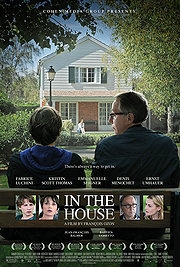
In The House, or Dans la maison if you’re a French type, is a seething comedy centred on the writing relationship between a bitter English teacher called Germain (Fabrice Luchini) and his talented, yet mischievous, student Claude (an astonishing Ernst Umhauer). Germain sets his students the task of writing an essay about their weekend, and while he despairs over the banality of some the class’ work, he is entranced by Claude’s writing. Claude’s weekend didn’t entail eating pizza in front of the TV. Claude spent his weekend lusting after the mother of one of his classmates, Rapha (Bastien Ughetto). It isn’t the sexual aspect of the essay that intrigues Germain – at least, that’s what he claims – but Germain is so taken by Claude’s writing that he begs his pupil to continue, putting both his career and his marriage at risk.
Pardon the generalisation, but foreign films tend to move at a slow pace. They get your attention, then squeeze it and draw it out across two hours or so, before handing you a thoroughly satisfying climax. Climax is the operative word, here. Claude constantly refers to Esther as the most bored woman in the world, something that he longs to fix ideally by spicing up her life with his youth and virility.
In The House views pretty much like intercourse; laced with furtive gazes and lingering shots of Rapha’s mother Esther (Emmanuelle Seigner), the camera panning from her feet, along her smooth legs, pausing at the split in her dress, her “middle-class curves” highlighted in a sunlit window. It picks up the pace to a nice gallop over its 105 minutes, culminating in a nicely drawn-out payoff that doesn’t quite hit the spot but leaves you gratified enough to have a cigarette.
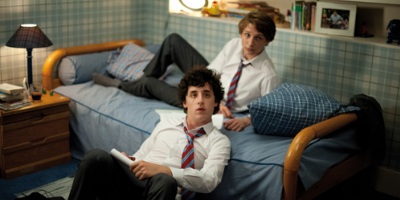
For Germain, it is simply about writing. He seems to be bored by anything remotely sexual. His dismisses his wife Jeanne’s (Kristin Scott Thomas) gallery dedicated to “dictators and sex” as “sex for perverts”. Claude’s writing takes over his personal life to the point that he rejects Jeanne’s advances in the bedroom and, when she questions him over whether his relationship with Claude is purely educational, he makes a rather bumbling attempt to deny it.
Luchini puts on his best Woody Allen schtick for this film – twitchy, cynical, insecure and fiercely intelligent; but as mentioned before, he is bitter. A failed writing career has made him look upon everything around him with disdain. He sees Claude as his protégé, an enfant terrible that he can vicariously live through. We’re invited to think about whether Germain should hold himself solely responsible for the disruption Claude causes in Rapha’s family; a casualty of Germain’s ambition and Claude’s libido.
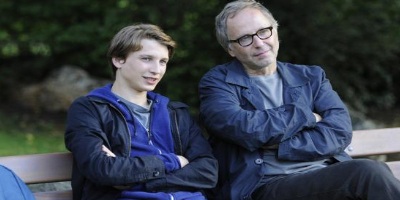
Umhauer is a perfect choice for Claude; on the surface he is a teen pin-up, all blue eyes, floppy blond hair and pillow lips, but he carries an intriguing and warped outlook. He seems to spend his time trying to worm into other people’s lives in a hollow attempt to fill the gap left by his own mother. Ultimately In The House is about exactly that – other people’s lives; the idea that you don’t know what goes on behind the closed doors of your neighbours. “There’s always a way in,” he declares with the salacious smirk of a very pretty Cheshire cat, “you just have to find it”. By the end, as Germain’s reality gets more and more muddled with Claude’s fiction, you wonder which life Claude struck out to disrupt: Rapha’s or his teacher’s.
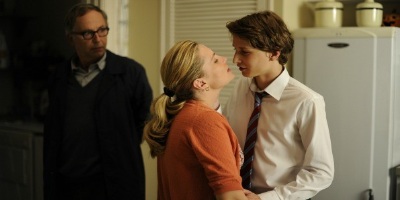
A special mention has to go out to Bastien Ughetto, who’s innocent, puppy-ish and smitten Rapha probably earns most of your sympathy. He starts off as a sheltered mummy’s boy who enjoys a catalogue-perfect relationship with his parents; eager to please his basketball-mad, Chinophile Dad, but ends up simply another pawn in Claude and Germain’s game. Some of his actions come across as petty and spiteful (for example, getting Germain suspended for helping Claude – and himself – cheat on a Maths test) but, in the grand scheme of things, they are entirely justified. He calls Claude his best friend, but Claude betrays him in the worst possible way. “Why Rapha?”, Claude asks in one of his many titillating essays. The answer could be because his mother is forty and fit, but a surprising scene between the two boys in Rapha’s room leaves the question unanswered.
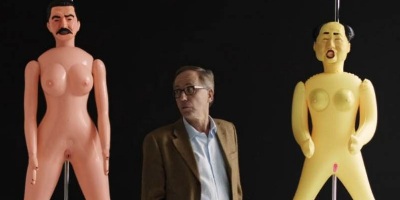
The last thirty minutes or so does let the rest of the film down. Director Ozon loses his way a bit, unsure of which world he prefers between Germain’s and Claude’s. This could be because the In The House is driven by broad ideas and themes: creativity, literature, voyeurism, as opposed to relatable human relationships. However, it’s a small glitch in what is otherwise an entertaining and memorable film that plays on the mind – in a sexy way, of course.

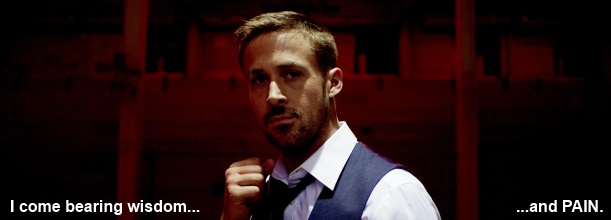

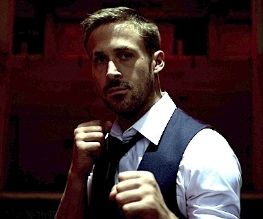
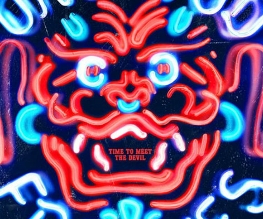
Recent Comments